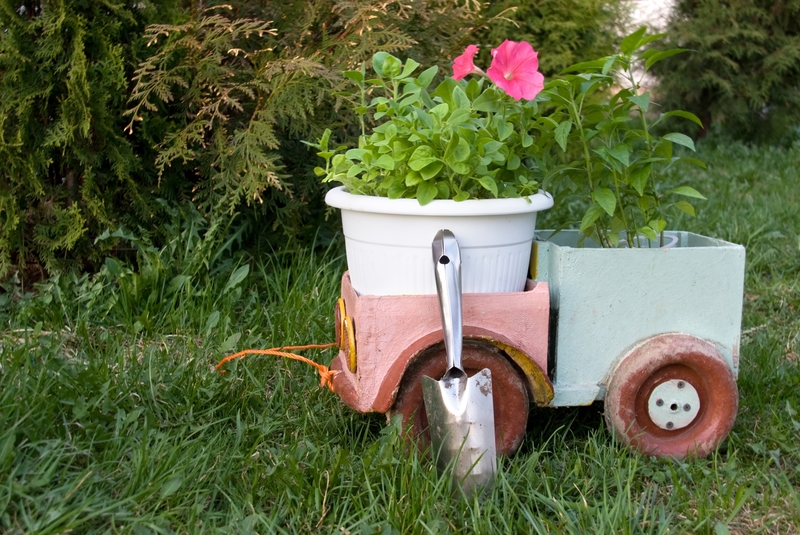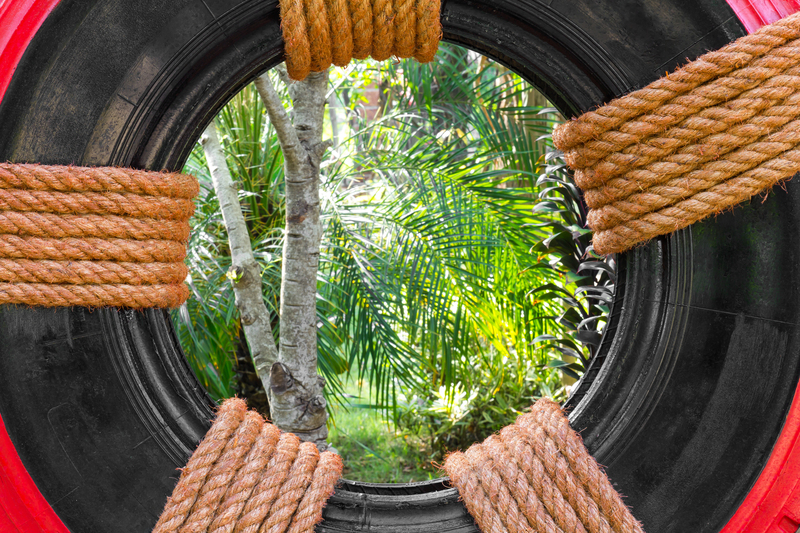Simplify Your Life: Stress Relief Through De-Cluttering
Are you feeling overwhelmed by the mess in your living spaces? Does the clutter in your home seem to translate into chaos in your mind? If so, you're not alone. Many people find that simplifying their environment leads to a calmer, more focused, and stress-free lifestyle. In this comprehensive guide, you'll discover how decluttering can help reduce stress and provide a pathway to simplicity, peace, and happiness.

Why Clutter Causes Stress
The impact of clutter goes far beyond the outward appearance of your home or workspace. Scientific studies have shown a significant link between disorganized environments and increased stress levels. The main reasons clutter is stressful include:
- Visual Overstimulation: Clutter bombards your brain with excessive stimuli, making it difficult to relax and concentrate.
- Distraction: It's much easier to get distracted when surrounded by miscellaneous items, reducing productivity and causing frustration.
- Inefficiency: Searching for misplaced items wastes both time and energy, adding to daily stress.
- Emotional Drain: Clutter may be a silent reminder of unfinished tasks or unresolved emotional issues.
De-cluttering for stress relief is a proactive solution that helps combat these effects, ultimately contributing to improved mental health and a renewed sense of control.
The Benefits of Decluttering for Stress Relief
If you've ever tidied up a messy room, you know the satisfying feeling that comes with seeing a clean, open space. But the advantages of simplifying your surroundings extend far beyond aesthetics:
- Reduces Anxiety: A neat and organized environment has a direct positive effect on your mood and anxiety levels.
- Enhances Concentration: With fewer distractions, your mind can focus better on the task at hand.
- Promotes Better Sleep: Studies show that people with cleaner bedrooms fall asleep faster and report better quality sleep.
- Strengthens Self-Esteem: Taking control of your space can give you a sense of accomplishment and boost confidence.
- Improves Physical Health: Fewer items mean less dust, mold, and allergens in your environment.
Decluttering is Self-Care
Think of decluttering as an act of self-care. When you choose to simplify your surroundings, you are prioritizing your own well-being. This sends a powerful message to yourself and those around you: your peace of mind matters. Over time, the routine practice of de-cluttering can help solidify healthier habits, nurture mindfulness, and build emotional resilience.
How to Begin the Decluttering Journey
Embarking on the journey to simplify your life through decluttering can feel daunting, especially if you don't know where to start. The key is to break the process into manageable steps. Let's explore effective strategies that can help you conquer clutter and reduce stress:
1. Set Clear Goals
- Define why you want to declutter (e.g., reduce stress, improve focus, create more space).
- Set realistic expectations--decluttering is a process, not a one-time event.
- Visualize the results to stay motivated.
2. Start Small
- Choose one space to start: Pick a single room, area, or even a drawer to keep things manageable.
- Use a timer: Commit to decluttering for just 15-20 minutes at a time to prevent overwhelm.
- Celebrate progress: Acknowledge small wins to keep momentum going.
3. The Four-Box Method
A popular system for organizing as you go is the "four-box method." Label boxes as:
- Keep
- Donate
- Trash
- Relocate
As you sort items, place them in the appropriate box. This method ensures you make decisions about each item, leading to a clutter-free environment much faster.
4. The One-In-One-Out Rule
To maintain your new, simplified space, adopt the one-in-one-out rule. For every new item you bring in, remove one that you no longer use. This prevents future accumulation and keeps stress low.
5. Digital Decluttering is Just as Important
Clutter isn't limited to physical items. Digital clutter--such as overflowing email inboxes, desktop icons, and unused apps--can be equally overwhelming. Regularly delete old files, unsubscribe from unwanted newsletters, and organize digital documents to experience the full stress-relief benefits of decluttering.
Organizing Techniques to Keep Stress Away
Once you have decluttered, it's important to set up systems to maintain order. Here are key organizing techniques that complement stress relief through simplification:
- Designate Daily Drop Zones: Create spots for keys, mail, and other everyday essentials to avoid clutter piling up again.
- Use Storage Solutions: Invest in bins, shelves, or drawer organizers to contain items and keep them out of sight.
- Label Everything: Especially in shared spaces, clear labeling helps everyone know where things belong.
- Establish Routines: Set aside a few minutes each day to tidy up and return things to their place.
Setting Boundaries to Prevent Clutter
Boundaries are vital for maintaining a simplified life. This includes:
- Learning to say no to impulse purchases.
- Communicating with family members about shared spaces.
- Encouraging everyone in the household to participate in upholding order.
Remember, simplifying your environment is an ongoing process. Consistency is key for lasting stress relief and continued peace of mind.
Minimalism: The Ultimate De-Cluttering Lifestyle
The growing popularity of minimalism demonstrates how simplifying can greatly reduce stress. Minimalism is about intentionally living with fewer possessions and focusing more on experiences and relationships. Minimalists often report:
- Heightened sense of freedom from material burdens
- Less anxiety about finances and belongings
- Greater appreciation for what truly matters
- More time for hobbies, self-care, and loved ones
While minimalism isn't for everyone, adapting minimalistic principles--even in small ways--can boost stress relief and create a more harmonious living environment.
Common Clutter Hot Spots and How to Tackle Them
To maintain a consistently peaceful home, focus on the areas that tend to collect clutter fastest. Here are some stress-reducing, room-by-room tips:
Entryway
- Install hooks and a shelf for shoes, bags, and coats.
- Use a small basket for mail and keys.
- Declutter seasonally to keep this crucial area tidy.
Kitchen
- Streamline countertops--limit items to essentials only.
- Organize cabinets with stackable bins and shelf risers.
- Regularly check for expired food and excess gadgets.
Bedroom
- Clear nightstands and dressers.
- Store out-of-season clothes elsewhere.
- Keep surfaces open to promote restful sleep.
Living Room
- Limit decor to favorite pieces.
- Use baskets to corral gadgets, remotes, or kids' toys.
- Set a weekly tidy-up routine.
Home Office
- Sort papers as soon as they come in.
- Use file folders and drawer organizers.
- Digitize documents when possible for less paper clutter.
Mindful Decluttering: Tips for Emotional Attachments
Letting go can often be the hardest part of decluttering, especially when sentimental items are involved. Here are strategies to gently work through this challenge:
- Take a photo of sentimental items before parting with them.
- Keep only what brings the most joy or has a special meaning.
- Ask yourself: Does this item support the life I want to live?
- Journal about your feelings to work through emotional attachments.
Practice Gratitude as You Declutter
Thank items for their purpose (a principle from the KonMari Method), then let them go with appreciation.
Sustaining a Clutter-Free, Stress-Free Life
Once you have simplified your environment, how do you keep it that way and continue enjoying the benefits of reduced stress? Incorporate these strategies into your daily routine:
- Daily Maintenance: Take five minutes morning and night to tidy up.
- Monthly Reviews: Regularly assess your space and let go of new clutter.
- Conscious Shopping: Pause and ask if a new purchase will enhance your life or add more stress.
- Celebrate Progress: Enjoy your easier, simplified life!

Frequently Asked Questions about De-Cluttering for Stress Relief
How does simplifying my life help with stress?
Simplifying your life through decluttering eliminates distractions, provides visual calm, increases productivity, and empowers you to prioritize what's important, all of which contribute to lower stress.
How often should I declutter?
Schedule decluttering sessions at least once a season or whenever you feel stress increasing. Small daily or weekly tidying sessions help maintain order and prevent overwhelm.
What if my family resists decluttering?
Lead by example, communicate the health and happiness benefits, and start with shared spaces. Invite family members to join you and participate in decision-making.
Conclusion: Embrace Simplicity for a Happier, Healthier Life
In today's fast-paced world, stress relief through decluttering is more than just a trend--it's a proven way to improve mental health, focus, and physical well-being. By intentionally simplifying your environment, you can create lasting changes that make everyday living easier and more enjoyable.
Remember: Start small, be kind to yourself, and celebrate your progress. Simplifying your life isn't about perfection; it's about finding more peace, joy, and freedom in your day-to-day routine. Experience firsthand how letting go of excess leads to a clearer mind, reduced stress, and a life you love.
Ready to get started? Pick one area to declutter today and begin your journey towards a more serene, simplified, and stress-free life!